Go After Them! Ofosu-Ampofo Tape Plays In Court

The leaked tape of the National Chairman of the opposition National Democratic Congress (NDC), Samuel Ofosu-Ampofo, in which he incited NDC members against some key public officials in the country, was yesterday played before an Accra High Court.
The over two hours tape which was recorded at a meeting of NDC communicators somewhere last year or so, had Mr. Ofosu-Ampofo telling the party members to make life uncomfortable for the targeted persons who included the Chairpersons of the Electoral Commission (EC) and National Peace Council (NPC).
The leaked tape also detailed how the party would approach campaign strategies, including what he described as ‘overt’ and ‘covert’ operations in the wake of the disturbances that characterized the Ayawaso West Wuogon bye-election last year.
“I want to assure you that as long as I remain the leader of our party, my approach to elections and security has completely changed… and we need to marshal all the human and material resources,” Mr. Ofosu-Ampofo stated when he took his turn to address the party faithful as captured on the tape.
Trial
Mr. Ofosu-Ampofo and one of the party’s leading communicators, Anthony Kwaku Boahen, are on trial over the tape which captures how the opposition NDC is allegedly planning to commit crimes in the country and turn round to blame them on the ruling New Patriotic Party (NPP).
Among the strategies were the creation of a general state of insecurity in the country through kidnappings, arson and verbal attacks on public officials like the Chairman of the NPC, Prof. Emmanuel Asante, and EC boss, Jean Mensa.
Mr. Ofosu-Ampofo has been charged with one count of conspiracy to cause harm and two counts of assault against a public officer.
Mr. Boahen, on the other hand, is facing one count of conspiracy to cause harm.
Tape
The case investigator, Detective Chief Inspector Bernard Berko, in his evidence-in-chief by the Director of Public Prosecution (DPP), Yvonne Atakora-Obuobisa, had told the court about how the police were informed about the existence of the tape and he subsequently followed up to obtain a copy of it and subsequently forwarded it to the Ghana Institute of Languages for transcription.
The tape was initially played in court but the defence lawyers objected to its tendering on the ground that the transcription tendered by the prosecution contained more statements than what was captured on the tape that was played in court. They insisted that the entire tape be played.
The trial court yesterday played the entire tape which was a recording of a meeting of the leadership of the NDC with some communication officers of the party.
Key Excerpts
Mr. Ofosu-Ampofo was heard in the tape telling the party faithful to wage a “relentless war” on the EC Chair as well as the need to “take her to the cleaners.”
“We will go after them. But we will not go after them face to face. We have to use tactical approaches to make life very uncomfortable for some of them. We will target some people and we will let the people know that their life is in danger and once they know their life is in danger they themselves will be careful.”
“As for that one I want to assure you that we will go all out to ensure that, as President John Mahama said, when it came to this game, in fact, we were better than them.”
“So you see that now we have a tactical advantage. Nobody has slept in his house. They even went to attack traders, and some Imams had to come and plead for them. People will also start capturing your mothers and fathers and keeping them hostage until you show yourself up. So we need to go back quickly to the drawing board and strategize.”
Peace Council
“There are CSO and religious organizations, especially the Peace Council Chair. For the first time, I will endorse insulting the Peace Council Chair. I like that. We have already started,” he said on the tape.
“So this is the briefing that I want to give and say that the party itself is going to come out with a number of policy initiatives. First, we are going to set up a security and intelligence unit within the party and appoint a national coordinator, a regional coordinator and a constituency coordinator.
Security Plan
“We will be picking some of our intelligence people, BNI people and national security people so that we can read and plan effectively, because you see, military people are military people. Their appreciation of security issues goes beyond what we can know.”
Tendering In Evidence
The tendering of the audio recording was heavily objected to by lawyers for the accused persons, who argued that the manner in which the tape was obtained breached the constitutional right to privacy of communication of the accused persons.
Tony Lithur, counsel for Mr. Ofosu-Ampofo, argued that from the background given by the investigator over the acquisition of the tape, it was “recorded surreptitiously without the knowledge of and consent of the accused persons or any of the persons present at the meeting.”
He said given that the tape was secured in breach of Article 18 Clause 2—the right to privacy of communication, it could not be allowed in evidence to implicate Ofosu-Ampofo in a crime.
He said allowing the tape to go into evidence “puts all of us at risk of having our constitutional rights violated deliberately under the guise of security.”
National Security
Mr. Lithur added that the tape could have been recorded by the National Security and circulated, and once it was in the public domain, the same National Security picked it up as a subject of a criminal prosecution and one of the basis for which the right of an individual could be violated by the state.
He prayed the court to refer the matter to the Supreme Court for interpretation, as he said the High Court did not have the jurisdiction to interpret constitutional matters.
Boahen Lawyer
Dr. Azizi Bamba, counsel for Kwaku Boahen, associated himself with Mr. Lithur, and added that the prosecution had not been able to demonstrate that the audio tape was obtained in accordance with the law.
He added that what made the “situation worse is that we do not know the identity of the individual who made the recording. It is beyond dispute that this recording was not made by the witness.
Prosecution Opposition
The objection was opposed by the DPP who argued that the audio recording was relevant and ought to be admitted into evidence.
She said from Section 51:1 of the Evidence Act, the information on the audio recording taken on February 3, 2019, was critical to prove the existence of the utterances made by the accused persons and would assist the court make a determination on the charges leveled against them.
Mrs. Atakora-Obuobisa argued that in Article 18 Clause 2, which guaranteed the protection of an individual’s privacy also created an exception which allowed the right to be interfered with for public safety or the economic wellbeing of the country, for the prevention of crime and the protection of rights and freedoms of others.
She prayed the court to admit the tape as the exception created by Article 18 Clause 2 far outweighs any other consideration to its exclusion.
Court Ruling
The court presided over by Justice Samuel Adibu Asiedu, a court of appeal judge sitting with additional responsibilities, in his ruling held that here is no evidence before the court that the audio that the prosecution sought to tender was recorded by the National Security or security agencies hence the issue of Security and Intelligence Act does not arise.
He said the court would turn down the request to refer the matter to the Supreme Court for interpretation as the matter had already been interpreted by the Supreme Court and the lower court ought to apply the ruling.
Justice Asiedu added that the exception created by Article 18 Clause 2 provides legal basis for the admission of the tape and therefore, overruled the objection and admitted the tape into evidence.
The case was adjourned to November 30 for continuation.
Source: Daily Guide





